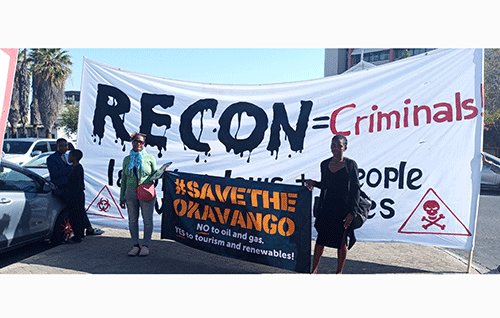Four community forest and conservancy organisations from the Kavango region claim there is no viable oil in the area as they fight to stop exploration activities by the Canadian company ReconAfrica, despite authorisation having been granted by the authorities.
The management committees of Ncumcara Community Forest, Muduva Nyangana Communal Conservancy, Katope Community Forest, as well as Kavango East and West Regional Conservancy and Community Forest Association laid bare their case in the High Court yesterday.
The group seeks an interim court interdict against ReconAfrica to restrain it from continuing any oil and gas exploration activities in the region, pending the finalisation of an appeal lodged against the environmental commissioner’s decision in favour of Reconnaissance Energy Namibia (Recon), a subsidiary of ReconAfrica.
The appeal is against the amendments
made on 15 June to ReconAfrica’s environmental clearance certificate, which
will allow the company additional and unspecified explorative activities.
It also allows for the company to drill new exploration wells.
Court interdict
During their submission, the group’s lawyer, Corinna Van Wyk, argued the matter is
one of urgency, as there is a threat of irreversible harm to the environment of the Kavango East and West regions.
She explained the construction of new wells and supporting infrastructure necessitates the levelling of forests and other vegetation in the Kavango region within areas that are protected by law.
“The creation of new tracks and cut lines will open previously pristine areas to illegal timber harvesting and poaching. Furthermore, the construction and operation of new stratigraphic wells and the side-tracking of existing wells create and increase risks of severe environmental degradation, including groundwater contamination, aquifer depletion and air pollution, argued van Wyk.
She further argued when the environmental commissioner issued the amended environment clearance certificate, he failed to consult the communities and the people affected.
“The continued exploration activities, whilst the environmental commissioner’s decision in question is the subject of an appeal, would amount to a gross disregard for the Constitution of the Republic of Namibia and the rule of law on which it is founded,” explained Van Wyk. Thus, an interdict is necessary. Making a counter-argument on behalf of the environmental commissioner, the deputy environment commissioner, commissioner of petroleum affairs and attorney general, lawyer Sisa Namandje said the group has no legal standing to bring forth the application; thus, the court cannot grant the orders sought. Furthermore, they have failed to prove there is a pending appeal.
“The primary stumbling block for the applicants to succeed with its interim relief application lies in its failure to prove in its founding affidavit that there is indeed a prescribed appeal pending before the minister on the finalisation of which the interim interdict if granted, will depend,” argued Namandje.
The environmental commissioner, Timoteus Mufeti, said the court does not have jurisdiction to grant the order’s sought by the conservancy groups.
He said the group has failed to give details on how the appeal was instituted, filed and served. There is also no proof that the appeal exists.
“The legislature chooses the minister as a person who can direct the operation, execution or suspension of my decision as the environmental commissioner,” explained Mufeti.
He said halting the drilling activities is costly, as it costs about US$30 000 (N$475 200) per day, and any delay has financial repercussions.
“If the court were to restrain the operations, which include the drilling operations at the concerned wells, it will have catastrophic and adverse effects on the environment if those open wells were not to be left unattended. It will necessarily result in massive contamination of underground water,” noted Mufeti.
Thus, the court should dismiss the application with cost.
In its defence, ReconAfrica says the drilling operations are not taking place in any community forest or conservancy managed by any of the conservancy organisations.
ReconAfrica and environmentalists
Although ReconAfrica’s oil exploration activities in the Kavango regions have been officially endorsed by the Parliamentary Standing Committee on Natural Resources, the Canadian-based company has since been under criticism from locals, who claimed there was no consultation before the company started its operations.
International and local environmentalists also claim the company has not fully disclosed how harmful its operations can be, nor the environmental impact it will have on the area.
But the company has the government’s backing, as energy minister Tom Alweendo last week emphasised the exploration firm is a potential investor in the oil and gas industry, although they have not made a discovery yet.
Alweendo observed during the information session that nobody said drilling for oil and gas is not going to cause environmental harm.
– mamakali@nepc.com.na



